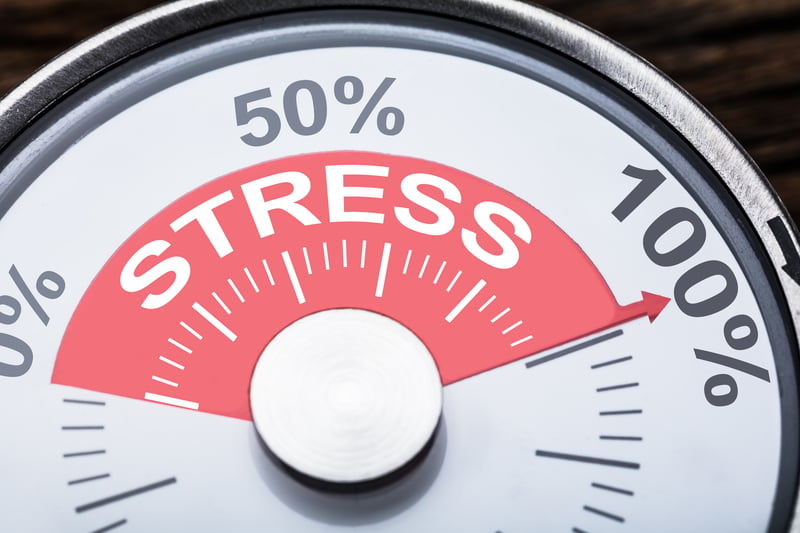The Scary Ways Chronic Stress Affects Your Bodily Systems

Despite our differences, if there’s a tie that binds us all, it’s stress. As nebulous as it may be, we all know what it means to feel stressed. And as you may have noticed, stress can rear its ugly head in many ways—which vary tremendously from person to person. Here are 9 ways stress affects your body and 15 tools to help reduce the harmful effects.
1. Stress and the Heart: Stress Can Make Your Blood Boil
Although stress is not considered a direct risk factor for cardiovascular disease—which, in case you weren’t aware, afflicts 1 in 2 Americans and is responsible for 1 out of every 4 deaths—too much stress typically promotes less-than-stellar behaviors such as poor diet, physical inactivity, using tobacco, or drinking alcohol more than usual.
You’ve probably heard someone say (or maybe even said yourself), “That makes my blood boil!” This figure of speech often implies stress increases blood pressure. And although the relationship is complex, there’s good evidence feeling stressed does increase blood pressure acutely and contributes to high blood pressure. 1,2
This effect is more pronounced in some people, who seem to be more “reactive” to stress than others (in terms of their increase in blood pressure). But interestingly, some research suggests being less reactive is predictive of lower cognitive function later in midlife. 3
2. Stress and Digestion: Stress Makes You Bloated
If you have noticed you tend to feel bloated more often when you’re under the gun, distressed, feeling anxious or worried, or eating on the run, it’s not your imagination. Stress can directly impair digestion.
For starters, stress activates the “fight-or-flight” branch of the nervous system. This can directly inhibit the body’s ability to “rest and digest.” 4 In other words, the body’s response to stress is polar opposite of its response to digestion! Even more, stress can directly impair digestion by reducing the production of stomach acid, which is essential for complete, timely, and proper digestion.
3. Stress and Gut Health: Stress Can Bust Your Gut
Speaking of the digestive system, we also know chronic stress can compromise the gut microbiota, contributing to dysbiosis and intestinal permeability (aka, “leaky gut”). 5 As you might have heard, leaky gut can contribute to gas and bloating, constipation and diarrhea, indigestion, food sensitivities, skin issues, allergies, joint discomfort, fatigue, brain fog, and more.
Meanwhile, gut dysbiosis, which refers to an unhealthy imbalance in the gut (e.g., an overgrowth of “bad” microbes, not enough “good” microbes, not enough microbial diversity), is linked to a long list of health concerns, including digestive-related problems, compromised metabolic function, obesity, skin problems, mood issues, allergies, autoimmune conditions, and more.
4. Stress and the Brain: Stress Makes You Dumb And Bummed
Ever notice that when you’re feeling stressed, you’re more prone to making mistakes? Stress is distracting (talk about “tunnel vision”), and it makes us move a little faster than normal. While a sense of urgency can be a tremendously powerful tool, stress-induced haste often leads to poor decisions, inefficiencies, and spinning your wheels.
For example, research shows individuals tend to make riskier decisions when they’re feeling stressed. However, the impact of stress on decision making is influenced by many factors, including the type and duration of stress and even the sex of the individual. (For example, men tend to take greater risks under stress than women.) 6
Stress also shifts decision-making from goal-directed to habit-based. In other words, when under duress, you’re more likely to default to your habits. 7 If you’ve got a good foundation of habits, then you’re in good shape. However, if you’re trying to make big things happen through change…then maybe this cliché rings a bell: “The definition of insanity is repeating the same actions over and over again and expecting different results.”
Besides its acute impact, prolonged stress can impair learning and memory. In other words, stress can quite literally make you dumber. What’s crazy is that chronic stress can actually shrink the hippocampal region of your brain, which is associated mainly with long-term memory. 8,9
The hippocampus also belongs to the all-important limbic system, which regulates emotion, learning, and more. This may explain why stress is also closely linked with mood-related issues like depression and anxiety. 9
Emerging evidence suggests limbic system dysfunction (i.e., stuck in “fight-or-flight” mode) is a probable suspect behind brain fog, fibromyalgia, hypersensitivity (for example, to smells, chemicals, allergens, etc.), chronic pain, gut issues, mood swings, sleep issues, and more.
5. Stress and the Immune System: Stress Makes You Sick
Ever noticed you’re more likely to get sick when you’re feeling particularly stressed? If so, you’re not alone. A study published in the prestigious New England Journal of Medicine, which examined the relationship between psychological stress and the frequency of the common cold among 394 healthy participants intentionally exposed to respiratory viruses, found that psychological stress was associated with an increased risk of upper respiratory tract infections and the common cold in a dose-dependent manner. 10 In other words, the more stressed the participants felt, the more likely they were to get sick.

Not surprisingly, psychological stress is associated with increased vulnerability to getting the flu. Studies have shown stressful life events, daily hassles, and negative mood states are predictive of experiencing more flu-like symptoms. What’s more, it appears the longer stress persists, the greater the risk of infection. 11
Researchers believe the link between stress and susceptibility to getting sick may be mediated by stress-induced disruption of the regulation of pro-inflammatory cytokines. Said differently, chronic stress decreases the immune response to a single acute stressor. In other words, the body builds a tolerance and becomes resistant to the signal. Since it’s been inundated over time, it just doesn’t recognize it as a big deal. This leads to suppression of a number of components of the immune system (e.g., natural killer cell activity, T and B cell function, salivary IgA concentration, and more). 12
6. Stress and Obesity: Stress Makes You Fat
Although the relationship is complex and highly individual, stress can lead to fat gain and influence how you store fat. In other words, stress may contribute to fat gain directly and indirectly.
Studies have shown folks with high waist-hip ratios (read: more belly fat and the ol’ “apple-shaped” body) tend to have decreased coping skills and secrete more of the “stress hormone” cortisol when faced with a stressful situation. This suggests a relationship between cortisol and abdominal fat accumulation. Additional studies have identified a similar association between cortisol concentrations, coping skills, chronic stress, and excess belly fat. 13,14
Pardon me as I geek out for a moment. A number of potential theories explain the stress-cortisol-belly-fat connection. For instance, the enzyme (i.e., HSD) that “activates” cortisol from its inactive form (i.e., cortisone) is more prevalent in visceral fat than subcutaneous fat tissue. 15 What’s more, visceral fat tissue has greater blood flow and four times as many cortisol receptors (compared to subcutaneous). 14 Even more, research shows that cortisol increases lipogenesis, which is the process of fat synthesis and storage. 16
It’s no secret stress can be a “trigger” for overeating. And stress has been associated with higher caloric intake, increased saturated fat and sugar consumption, and poor diet quality. 17 In fact, research shows around 70% of individuals increase their food intake during periods of stress. 18,19
Females, overweight individuals, and folks who think about food or body weight obsessively are more likely to eat when stressed. 20 As one might expect, research also shows that stress-induced eating typically involves a predisposition for high-sugar and high-fat foods, which are “comfort foods” believed to provide strong rewarding effects and reinforce snacking. 21
7. Stress and Sleep: Stress Makes You an Insomniac
Ever felt “tired but wired?” That’s a pretty good indication that stress is weighing you down (and/or your circadian rhythms are out of whack, which could very well be attributed to stress). Generally speaking, higher levels of cortisol correlate with impaired sleep, including: 22–24
- Decreased sleep efficiency
- Fewer stages of deep sleep
- Decreased slow-wave sleep
- Reduced REM sleep
- Increased number of awakenings
- Fragmented sleep
- Shorter sleep time
- Increased sleep latency (i.e., longer time to fall asleep)
8. Stress and Muscles: Stress Makes You Weak
Stress is an inherent part of the strength-, muscle-, and endurance-building processes. Simply put, muscular adaptation is the result of stress (i.e., progressive resistance/exercise). In other words, if you want to get stronger, build bigger muscles, or run faster/longer, you’ve got to push (i.e., stress) yourself over time (with more volume and/or intensity). After all, if you don’t use it (sedentary lifestyle), you lose it (atrophy).
While the acute stress response—and even cortisol, which is often portrayed as entirely negative, particularly by strength athletes, bodybuilders, and fitness enthusiasts—plays a tremendously important and fundamental role in the adaptation process, persistent, untamed stress can have harmful effects when it comes to building muscle and strength.
Although it’s an overly simplistic view, cortisol is considered a “catabolic” hormone. This means it breaks down tissues (typically to liberate energy). Building muscle, on the other hand, is an “anabolic” process. You may be familiar with one of the body’s most noteworthy hormones: testosterone. Along those lines, there tends to be an inverse relationship between cortisol and testosterone, and stress and elevated cortisol typically have a negative effect on circulating testosterone levels. 25
Fundamentally, if you want to “build” muscle and strength, then the anabolic processes must outweigh the catabolic ones. And although cortisol serves a variety of functions, chronic stress can swing the pendulum in favor of catabolism.
9. Stress and Metabolic Health: Stress Makes You Diabetic
For many people, stress is synonymous with the hormone cortisol, which is often dubbed the stress hormone. While it’s almost always viewed in a negative light, let’s make something abundantly clear: The hormone cortisol isn’t inherently “bad.”
In fact, it serves very important physiological functions. In the short-term, along with the catecholamines, cortisol is essential for adaptation, homeostasis, and survival. 26 For instance, cortisol (which belongs to the glucocorticoid family of hormones) has a profound effect on blood sugar regulation, as its role is to liberate glucose when blood sugar levels are low.
Obviously, that would be very important during acute periods of stress when energy is needed (e.g., fasting, exercise). But let’s face it, most people reading this are surrounded by calorie-dense, highly-palatable food options, which are available any hour of the day—even without stepping foot outside your home, office, or hotel room.
The point is this: Most people are overeating processed foods, which tend to be rife with glucose-spiking refined grains and added sugars. Combine the two, and you have a recipe for poor glycemic control, which can impact everything from cardiovascular health to cognitive function to obesity to energy levels and more. For instance, research shows feeling acutely stressed can significantly increase the blood glucose response to a meal. 27 And although the relationship may be more complex, evidence suggests cortisol dysregulation is associated with insulin resistance and type 2 diabetes. 28
15 Ways to Manage Stress
Clearly stress is a ubiquitous part of life. In other words, you’re not going to get rid of it any time soon, nor should you. It’s a classic case of “the dose makes the poison.” In other words, the stress response can be beneficial and productive when appropriate. It’s when it’s persistent, untamed, and untimely that it can do damage.
The good news is there’s a LOT you can do to help manage stress and support a healthy stress response. The better news is that we’ve talked a TON about various stress management techniques, and here are some I’ve found to be most effective:
- Reframe (i.e., your viewpoint of the situation/circumstances)
- Breathe deeply
- Take a walk outside
- Spend time in nature
- Set boundaries (i.e., learn to say no)
- Let go
- Practice mindfulness
- Pray
- Count your blessings (i.e., practice gratitude)
- Meditate
- Exercise
- Practice yoga
- Spend time with good people (i.e., social connectedness)
- Clean up your diet
- Supplement with adaptogenic herbs (e.g., Ashwagandha, Rhodiola)
Keep in mind there’s no one-size-fits-all approach. Tools that work well for some people may not float your boat. On the flipside, the go-to tool in your stress-management toolbox may be utterly useless for your friend (who might get stressed out trying to force a square peg into a round hole).








